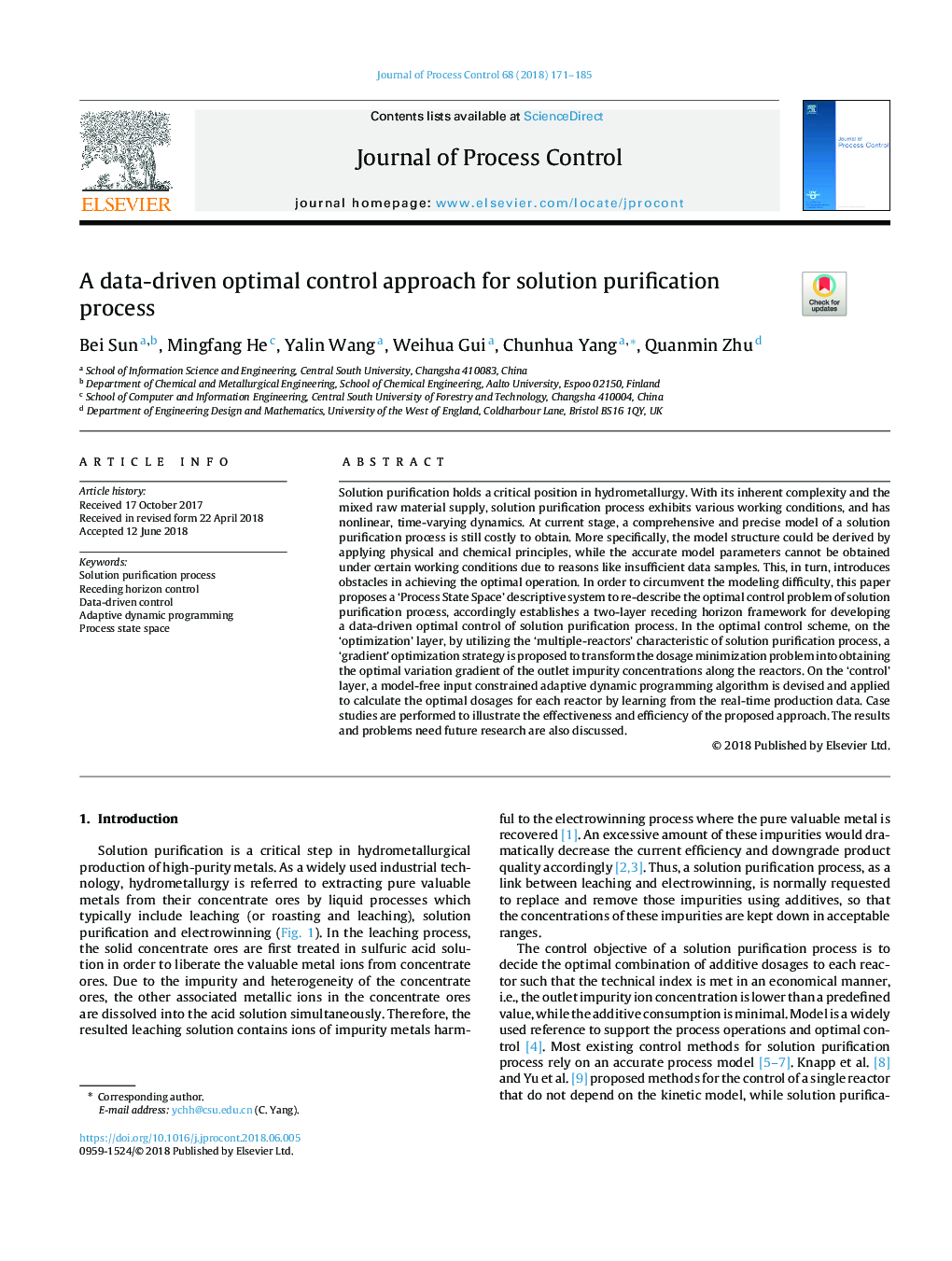| کد مقاله | کد نشریه | سال انتشار | مقاله انگلیسی | نسخه تمام متن |
|---|---|---|---|---|
| 7104145 | 1460335 | 2018 | 15 صفحه PDF | دانلود رایگان |
عنوان انگلیسی مقاله ISI
A data-driven optimal control approach for solution purification process
ترجمه فارسی عنوان
رویکرد کنترل مطلوب برای داده ها برای فرآیند تصفیه محلول
دانلود مقاله + سفارش ترجمه
دانلود مقاله ISI انگلیسی
رایگان برای ایرانیان
کلمات کلیدی
روند تصفیه محلول، کنترول افق، کنترل مبتنی بر داده ها، برنامه ریزی پویا سازگار، فضای حالت فرآیند،
ترجمه چکیده
تصفیه محلول در جایگاه بحرانی در هیدرومتالورژی قرار دارد. با پیچیدگی ذاتی و عرضه مواد مخلوط خام، فرآیند تصفیه محلول شرایط مختلف کاری را نشان می دهد و دارای پویایی غیر خطی و متغیر زمان می باشد. در مرحله حاضر، یک مدل جامع و دقیق از یک فرایند تصفیه محلول هنوز هم هزینه ای برای به دست آوردن آن است. به طور خاص، ساختار مدل می تواند با استفاده از اصول فیزیکی و شیمیایی حاصل شود، در حالی که پارامترهای مدل دقیق در شرایط کاری خاص به دلایل مانند نمونه های داده های کافی نمی توانند به دست آیند. این به نوبه خود، موانعی را در دستیابی به عملیات بهینه ارائه می دهد. به منظور جلوگیری از مشکل مدل سازی، در این مقاله یک سیستم توصیفی فضایی حالت فرایند برای توصیف مسئله کنترل مطلوب فرآیند تصفیه محلول پیشنهاد می شود و بر اساس آن یک چارچوب افق پایدار دو لایه برای ایجاد یک کنترل بهینه بر اساس اطلاعات فرایند تصفیه محلول. در طرح کنترل مطلوب، در لایه «بهینه سازی»، با استفاده از ویژگی «چند رآکتور» در فرآیند تصفیه محلول، یک استراتژی بهینه سازی «گرادیان» پیشنهاد می شود تا مشکل کمینه سازی دوز را برای به دست آوردن شیب تغییر مطلوب خروجی ارائه دهد غلظت ناخالص در طول رآکتورها. در لایه کنترل، یک ورودی آزاد بدون محدودیت الگوریتم برنامه ریزی پویا سازگار، برای محاسبه دوز مطلوب برای هر راکتور با یادگیری از داده های تولید در زمان واقعی طراحی و اجرا می شود. مطالعات موردی برای نشان دادن اثربخشی و کارآیی روش پیشنهادی انجام شده است. نتایج و مشکلات مورد نیاز پژوهش های آینده نیز مورد بحث قرار گرفته است.
موضوعات مرتبط
مهندسی و علوم پایه
مهندسی شیمی
تکنولوژی و شیمی فرآیندی
چکیده انگلیسی
Solution purification holds a critical position in hydrometallurgy. With its inherent complexity and the mixed raw material supply, solution purification process exhibits various working conditions, and has nonlinear, time-varying dynamics. At current stage, a comprehensive and precise model of a solution purification process is still costly to obtain. More specifically, the model structure could be derived by applying physical and chemical principles, while the accurate model parameters cannot be obtained under certain working conditions due to reasons like insufficient data samples. This, in turn, introduces obstacles in achieving the optimal operation. In order to circumvent the modeling difficulty, this paper proposes a 'Process State Space' descriptive system to re-describe the optimal control problem of solution purification process, accordingly establishes a two-layer receding horizon framework for developing a data-driven optimal control of solution purification process. In the optimal control scheme, on the 'optimization' layer, by utilizing the 'multiple-reactors' characteristic of solution purification process, a 'gradient' optimization strategy is proposed to transform the dosage minimization problem into obtaining the optimal variation gradient of the outlet impurity concentrations along the reactors. On the 'control' layer, a model-free input constrained adaptive dynamic programming algorithm is devised and applied to calculate the optimal dosages for each reactor by learning from the real-time production data. Case studies are performed to illustrate the effectiveness and efficiency of the proposed approach. The results and problems need future research are also discussed.
ناشر
Database: Elsevier - ScienceDirect (ساینس دایرکت)
Journal: Journal of Process Control - Volume 68, August 2018, Pages 171-185
Journal: Journal of Process Control - Volume 68, August 2018, Pages 171-185
نویسندگان
Bei Sun, Mingfang He, Yalin Wang, Weihua Gui, Chunhua Yang, Quanmin Zhu,
